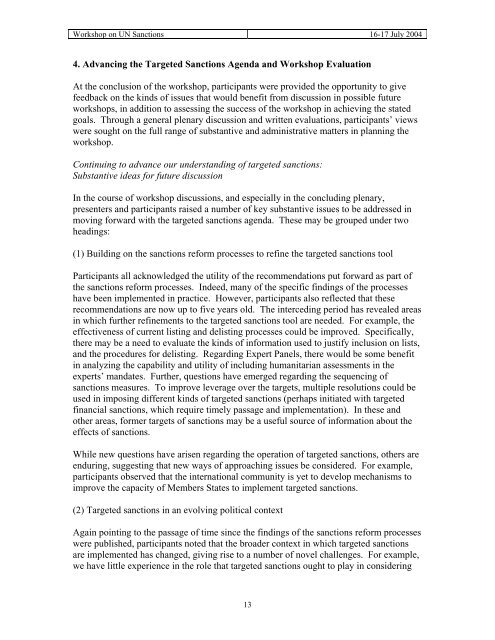UN Sanctions Reform - The Watson Institute for International Studies
UN Sanctions Reform - The Watson Institute for International Studies
UN Sanctions Reform - The Watson Institute for International Studies
Create successful ePaper yourself
Turn your PDF publications into a flip-book with our unique Google optimized e-Paper software.
Workshop on <strong>UN</strong> <strong>Sanctions</strong> 16-17 July 2004<br />
4. Advancing the Targeted <strong>Sanctions</strong> Agenda and Workshop Evaluation<br />
At the conclusion of the workshop, participants were provided the opportunity to give<br />
feedback on the kinds of issues that would benefit from discussion in possible future<br />
workshops, in addition to assessing the success of the workshop in achieving the stated<br />
goals. Through a general plenary discussion and written evaluations, participants’ views<br />
were sought on the full range of substantive and administrative matters in planning the<br />
workshop.<br />
Continuing to advance our understanding of targeted sanctions:<br />
Substantive ideas <strong>for</strong> future discussion<br />
In the course of workshop discussions, and especially in the concluding plenary,<br />
presenters and participants raised a number of key substantive issues to be addressed in<br />
moving <strong>for</strong>ward with the targeted sanctions agenda. <strong>The</strong>se may be grouped under two<br />
headings:<br />
(1) Building on the sanctions re<strong>for</strong>m processes to refine the targeted sanctions tool<br />
Participants all acknowledged the utility of the recommendations put <strong>for</strong>ward as part of<br />
the sanctions re<strong>for</strong>m processes. Indeed, many of the specific findings of the processes<br />
have been implemented in practice. However, participants also reflected that these<br />
recommendations are now up to five years old. <strong>The</strong> interceding period has revealed areas<br />
in which further refinements to the targeted sanctions tool are needed. For example, the<br />
effectiveness of current listing and delisting processes could be improved. Specifically,<br />
there may be a need to evaluate the kinds of in<strong>for</strong>mation used to justify inclusion on lists,<br />
and the procedures <strong>for</strong> delisting. Regarding Expert Panels, there would be some benefit<br />
in analyzing the capability and utility of including humanitarian assessments in the<br />
experts’ mandates. Further, questions have emerged regarding the sequencing of<br />
sanctions measures. To improve leverage over the targets, multiple resolutions could be<br />
used in imposing different kinds of targeted sanctions (perhaps initiated with targeted<br />
financial sanctions, which require timely passage and implementation). In these and<br />
other areas, <strong>for</strong>mer targets of sanctions may be a useful source of in<strong>for</strong>mation about the<br />
effects of sanctions.<br />
While new questions have arisen regarding the operation of targeted sanctions, others are<br />
enduring, suggesting that new ways of approaching issues be considered. For example,<br />
participants observed that the international community is yet to develop mechanisms to<br />
improve the capacity of Members States to implement targeted sanctions.<br />
(2) Targeted sanctions in an evolving political context<br />
Again pointing to the passage of time since the findings of the sanctions re<strong>for</strong>m processes<br />
were published, participants noted that the broader context in which targeted sanctions<br />
are implemented has changed, giving rise to a number of novel challenges. For example,<br />
we have little experience in the role that targeted sanctions ought to play in considering<br />
13
















